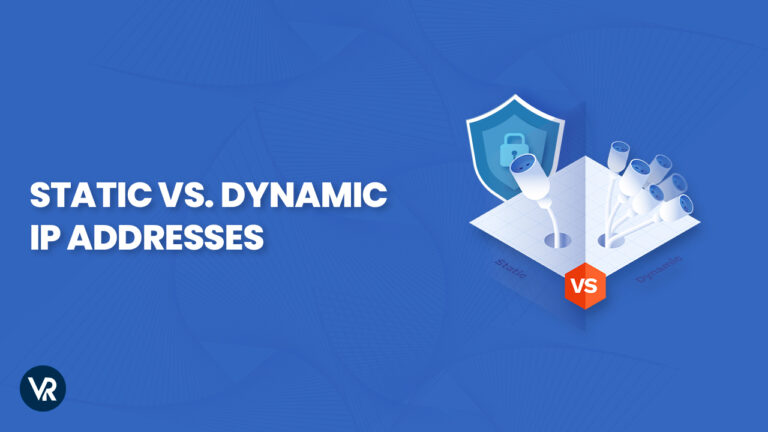
Ever thought about how you are identified on the internet? Your network and the internet are both linked with the Internet Protocol addresses categorized as static or dynamic addresses. Knowing the characteristics of Static vs Dynamic IP Address is important to understand the functionality.
But what is the difference between a dynamic and a static IP address? The static IP addresses don’t change once assigned to a device, while dynamic IP addresses are given by the network and change over time. Even using a premium VPN service, you can easily change your IP address.
In this post, we explain the advantages and drawbacks of Static IP Address vs Dynamic and how you can check the address of your device.
How to check Static vs Dynamic IP Address? [Quick Overview]
Most devices are assigned a dynamic IP address by the network on connection. If you haven’t paid additionally for a static IP address, your IP will more likely be a dynamic address. However, you can easily check the static IP vs. dynamic IP address type assigned to your device.
Here are the simple steps to check if you have a status or dynamic IP address:
- Right-click on the Start menu
- Type Command Prompt in the search bar and hit Enter.
- Next, click to open Command Prompt.
- Type ipconfig/all in the window and hit Enter.
- Search for DHCP Enabled If it is set as “Yes”, your device has a dynamic IP address. But if it is “No, ” you have a static IP.
Key Takeaways: Static vs Dynamic IP Address
The key takeaways of dynamic vs. static IP address are listed below:
- IP Address Basics:
- IP addresses are unique numbers assigned to devices on networks.
- Static IP Addresses:
- Manually set, unchanging addresses.
- Ideal for servers, remote access, and consistent services.
- Dynamic IP Addresses:
- Automatically assigned, may change over time.
- Great for individual devices and efficient network management.
Advantages & Disadvantages of Having Static IP Address
Having a static IP address has many advantages and a few limitations. We have covered the pros and cons in this section to help you guide on Static vs Dynamic IP Address.
- Easier Communication: With static IP addresses, Voice over Internet Protocol (VoIP) becomes easier and more reliable to use for teleconferencing and audio or video communication.
- Better Support: Static IP addresses are easy to manage and configure with DNS servers.
- Convenient Access: Static IP addresses provide a flexible infrastructure to work remotely with a Virtual Private Network (VPN) or any other remote programs.
- Accurate Geo-location Services: Different services can match the IP address with a physical location using a static IP address. For instance, you would get the weather updates of your region by accessing the local weather service rather than any other city using a static IP address.
- Server Hosting: Having a static IP address while hosting an email server, web server, or any other type of server can facilitate your customers to search for you via DNS easily.
Static IP addresses aren’t suitable to be used in all cases. Some of the factors to avoid static IP addresses are given below:
- Expensive Plans: ISPs often charge more on consumer packages for assigning static IP addresses. While business plans usually include an option for static IP, they cost more than end-user plans. You can ask your provider for the additional charges.
- More Unsafe: Hackers can track your server exactly using the static IP address on the internet. Therefore, it becomes easily vulnerable online.
- Security Issues: Anyone on the network having access to the right tools and techniques can know the exact location of you and your devices.
Advantages & Disadvantages of Having Dynamic IP Address
Dynamic IP addresses come with several advantages and a few drawbacks. We have listed them in this section to clarify static ip address vs dynamic.
Dynamic IP addresses are generally cheaper to configure and easier to maintain than static IP addresses. Here we discuss the pros of using dynamic IP address:
- Low cost: Dynamic IP addresses come with affordable plans where you can save huge money.
- Enhanced Security: Dynamic IP addresses are safer than static IPs. You can boost your security by adding a dynamic IP VPN to mask your connection on the network.
- Improved Physical Protection: Hackers can’t easily locate you and your device on a network with a dynamic IP address. Eventually, they fail to target your device.
- Unlimited Addressing: When you connect to a network, your device is automatically assigned a fresh dynamic IP address as required. In case you add a new device to your network, you don’t have to configure it manually add it and erase the old address. Rather, it is done by your router which prevents assigning similar addresses to two devices on the network. Moreover, you can reuse dynamic IP addresses.
- Simple Configuration: In the case of dynamic IP addresses, the DHCP servers are responsible for assigning the IP addresses available without involving you in giving instructions.
Dynamic IP addresses are not feasible for all conditions. When it comes to Internet-facing services, for instance, email or the web, dynamic IP addresses don’t work.
Here is the list of other cons of dynamic IP address:
- Limited Remote Accessibility: If you are relying on remote access software, it may face problems while establishing a connection on a dynamic IP address.
- May Not Work With Hosted Services: Using a dynamic IP address can be problematic if you are planning to host an email or web server because DNS servers usually don’t work properly with constantly changing dynamic IP addresses. Although some DNS services can resolve this issue, they are complicated and expensive to configure.
- Low Accuracy: When you are assigned a dynamic IP address, your real location is not reflected properly so the weather services fail to show the desired results accurately.
- High Downtime: In some rare occurrences, your ISP may fail to assign you a dynamic IP address disrupting your internet connection. If you are an individual user, it can only be a temporary glitch. However, it can be a major setback for companies running websites that go offline.
How to check Static IP Address vs Dynamic on different devices (In-detailed)
To check Static IP Address vs Dynamic on different devices, you need to follow a different procedure depending on your operating system. After you find your IP address, simply restart the device and see if it remains the same. If it does, you have a static IP, otherwise a dynamic IP address.
Here’s a detailed guide to checking your static IP vs dynamic IP on various operating systems:
To find your IP address on a Mac:
- Open the System Preferences.
- Then, click on “”
- Next, select your Wi-Fi network.
- Press “Advanced.”
- Click on “TCP/IP.”
- View the IP address assigned to your device under “IPv4.”
To find your IP address on a computer (Windows 10):
- Launch the taskbar on your Windows computer.
- Select “Wi-Fi Network.”
- Pick the network that you are connected to.
- Next, select “Properties.”
- Find your IP address under “IPv4 Address.”
To find your IP address on an Android:
- Open “Settings.”
- Click on “About.”
- Select “Status.”
- Lastly, select “IP Address” to check the IP of your Android device.
Finally, to see your iPhone’s IP address:
- Launch “Settings” on your iPhone.
- Click on “Wi-Fi.”
- Click “Network” below the lowercase ‘i’.
- Find your IP address visible under “IPv4 Address.”
How Do I Protect My IP Address?
You can protect your IP address using two popular methods, Virtual Private Network (VPN) and proxy servers. Using any one of the two will be sufficient. However, proxy servers come with several limitations so they should be avoided. On the other hand, VPNs have become an ideal choice for users for IP address protection.
A proxy server is a checkpoint to route your traffic on the internet and hide your IP from hackers. Moreover, it allows anonymous browsing on the internet to visit websites privately. One of the drawbacks of using proxy servers is the constantly annoying ads popping up on the screen and incompatibility issues of the cheaper servers.
Whereas a VPN masks your IP address and makes it appear to be from the country where the VPN server is operating. Your data is sent via secure tunnels and routed safely to the websites you visit hiding your IP addresses and making them private. Therefore, using a VPN with dynamic IP is highly recommended to improve your connection security and hide your IP online.
Make sure you select the best VPN with the most IP addresses to get multiple server choices in different regions. To make the process faster, the fastest VPN service will connect you to the nearest location within seconds and help you manipulate your IP address to any of your preferred regions. Additionally, if you are low on budget, you can get cheap VPN services for your connection to easily change your location with a VPN.
To protect your IP address with a VPN, follow the steps given below:
- Download a suitable VPN app on your device or get a browser extension. We suggest ExpressVPN to experience advanced IP protection and data safety on your network.
- Log in to your account with your credentials.
- Search for the servers in the region of your choice and connect to it.
- That’s it! Your IP connection is successfully protected.
- IP Address vs Gateway : Unveiling the difference between IP Addresses and Gateways
- IP Address vs MAC Address : Decoding network difference between IP and MAC Addresses
Dynamic vs Static IP Address – FAQs
Is a static IP address more secure?
No, a static IP address is not secure. A dynamic IP address provides better security than a static IP address because tracking anyone online is hard as the IP is changing constantly. Moreover, hackers can’t find your exact physical location or attack your device.
How to protect your IP address, whether it’s static or dynamic?
Whether you have a static or dynamic IP address, you can use a trustworthy VPN service provider. Hackers and tech-savvy individuals can trace your location and see what you are doing on the internet. We suggest using ExpressVPN to hide your IP address from the snoopers. Regardless of the static vs dynamic conflict, use a VPN to secure your activities online.
Is it better to have a static or dynamic IP?
It is better to have a static IP address for DNS servers, business use, and VoIP communication, whereas, a dynamic IP address works well for individual consumers and those who aren’t willing to spend money for an IP.
Conclusion
Static and dynamic IP addresses are two types of IP addresses ideal for different network conditions. If you know what is the difference between static IP and dynamic IP, you can easily pick the one ideal for your situation.
Static IP is ideal for businesses hosting their online services and websites. Whereas, dynamic IP is great for individual consumers intending to use the network without any costs. We have compiled this guide on Static vs Dynamic IP Address by highlighting the pros and cons and detailed steps to check the two.
You can even find someone’s IP address on an unprotected network. Therefore, to secure dynamic vs static IP address, it is essential to use ExpressVPN.
